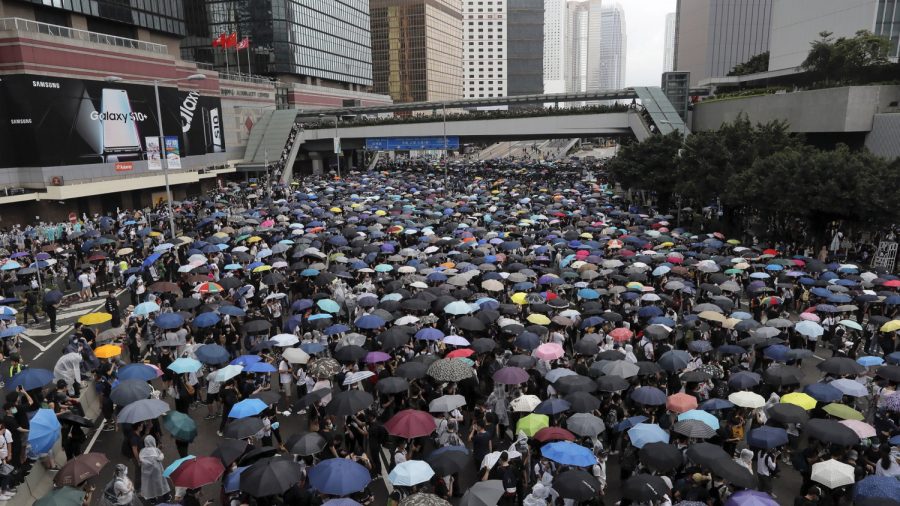HONG KONG—Following a day of sit-ins, tear gas and clashes with police, Hong Kong students and civil rights activists vowed Wednesday, June 12, to keep protesting a proposed extradition bill that has become a lightning rod for concerns over greater Chinese control and erosion of civil liberties in the former British colony.
The violence marked a major escalation of the biggest political crisis in years for the semi-autonomous Chinese territory and forced the delay of legislative debate on the contentious bill.
College student Louis Wong said he considered the blockade of government headquarters and the Legislative Council a success because it appeared to prevent Beijing loyalists from advancing amendments to a pair of laws that would make it easier to suppress the political autonomy of Hong Kong.
“This is a public space and the police have no right to block us from staying here,” Wong said, surveying an intersection in the Admiralty neighborhood that had been blocked off by security forces after protesters broke through a police cordon and entered the government complex.
“We’ll stay until the government drops this law and (Chinese President) Xi Jinping gives up on trying to turn Hong Kong into just another city in China like Beijing and Shanghai,” he said.
Police fired tear gas and used pepper spray on protesters who had massed outside the government building overnight Tuesday and began pressing against the police early Wednesday.
The overwhelmingly young crowd had overflowed onto a major downtown road.
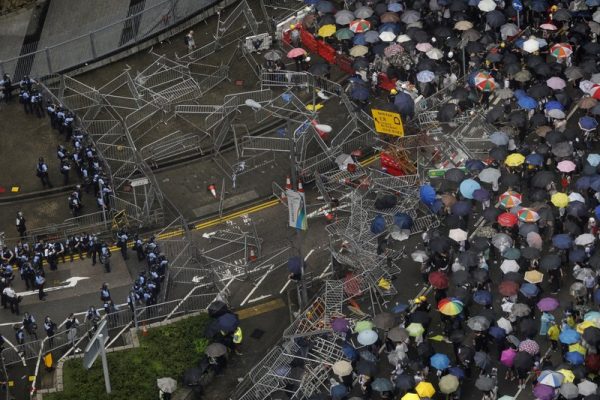
At a brief news conference held as the chaos swirled just outside, Police Commissioner Stephen Lo Wai-chung said police used pepper spray, bean bag rounds, rubber bullets, and tear gas in “serious clashes.” He added that police were still counting how many people were injured.
Lo called the demonstration a riot. That could mean long jail terms for anyone arrested, adding to fears that Hong Kong’s government is using public disturbance laws to intimidate protesters.
A curt government statement said a scheduled 11 a.m. legislative session would be “changed to a later time.” Officials gave no indication of when that would be, and Hong Kong leader Carrie Lam canceled a news briefing.
Some businesses also closed for the day, and labor strikes and class boycotts were called.
The protests by the bill’s opponents are the largest since pro-democracy demonstrations closed down parts of the Asian financial center for more than three months in 2014.
The demonstrations pose a challenge to Xi, who has said he would not tolerate Hong Kong being used as a base to question the ruling Communist Party’s authority. But they are also giving a voice to the young in the territory who feel alienated by a political process dominated by the economic elite.
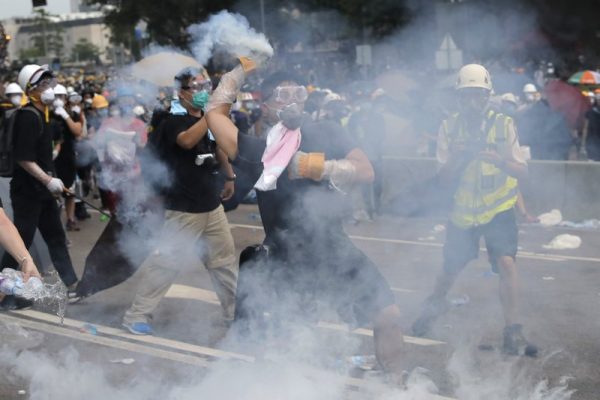
The state of the legislative process for the bill remained unclear following the violence, which had largely ended by about 5 p.m. after police herded demonstrators across a pedestrian bridge. Traffic in one of the busiest parts of the city remained blocked, however, and several hundred protesters seemed in no hurry to leave.
The protesters said they hoped the blockade would lead to Lam’s administration shelving the measure.
“We want the government to just set the legislation aside and not bring it back,” said a protester who gave only his first name, Marco, because he feared possible repercussions from authorities.
Another protester, who gave her name only as King, also out of fear of repercussions, said the protest was a watershed moment for Hong Kong’s young generation.
“We have to stand up for our rights or they will be taken away,” she said.
Dressed in black T-shirts and jeans, many protesters appeared undaunted by police demands to disperse. The demonstrators also appeared mindful of Beijing’s growing use of electronic surveillance such as facial recognition technology to build dossiers on those it considers politically unreliable, and many of them wore surgical masks to hide their features as well as reduce the effects of tear gas.
Such protests are never tolerated in mainland China, and Hong Kong residents can face travel bans and other repercussions if they cross the border.
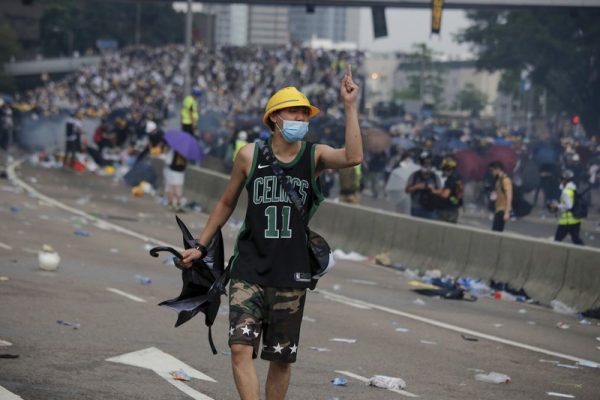
“Most of these protesters don’t expect the government to compromise. They just want to express their own opinions,” said Joseph Cheng, a long observer of Chinese and Hong Kong politics now retired from the City University of Hong Kong. “The anger is still there and the anger will burst again at the next opportunity.”
In an interview with Hong Kong broadcaster TVB, Lam denied she was “selling out” Hong Kong with the extradition bill but conceded the measure would continue to attract criticism.
Speaking on her failure to the people, her voice cracked as she said: “They said I’m selling out Hong Kong. How could I do that? I grew up here with everyone else in the city.”
Under its “one country, two systems” framework, Hong Kong was supposed to be guaranteed the right to retain its own social, legal and political systems for 50 years following its handover from British rule in 1997. However, China’s Communist Party has been seen as increasingly reneging on that agreement by forcing through unpopular laws.
The government had pushed ahead with the extradition measure despite a weekend protest by hundreds of thousands of people in the largest political demonstration in more than a decade.
Protests Against Criminal Extradition To Mainland China
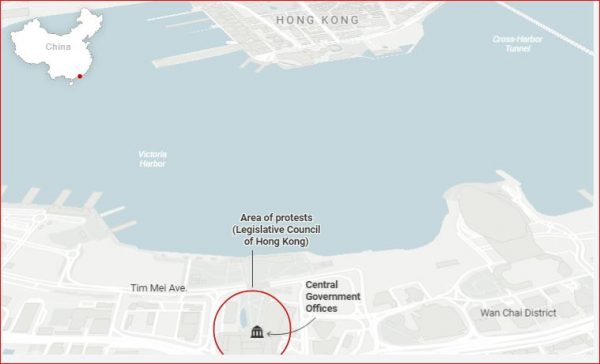
The protests are widely seen as reflecting growing apprehension about relations with the mainland, where Xi has said he has zero tolerance for those demanding greater self-rule for Hong Kong.
Critics believe the extradition legislation would put Hong Kong residents at risk of becoming trapped in China’s judicial system, in which opponents of Communist Party rule have been charged with economic crimes or ill-defined national security offenses, and would not be guaranteed free trials.
Opponents of the proposed extradition amendments say the changes would significantly compromise Hong Kong’s legal independence, long viewed as one of the crucial differences between the territory and the mainland.
Hong Kong currently limits extradition to jurisdictions with which it has existing agreements and to others on an individual basis. China has been excluded from those agreements because of concerns over its judicial independence and human rights record.
By Christopher Bodeen

